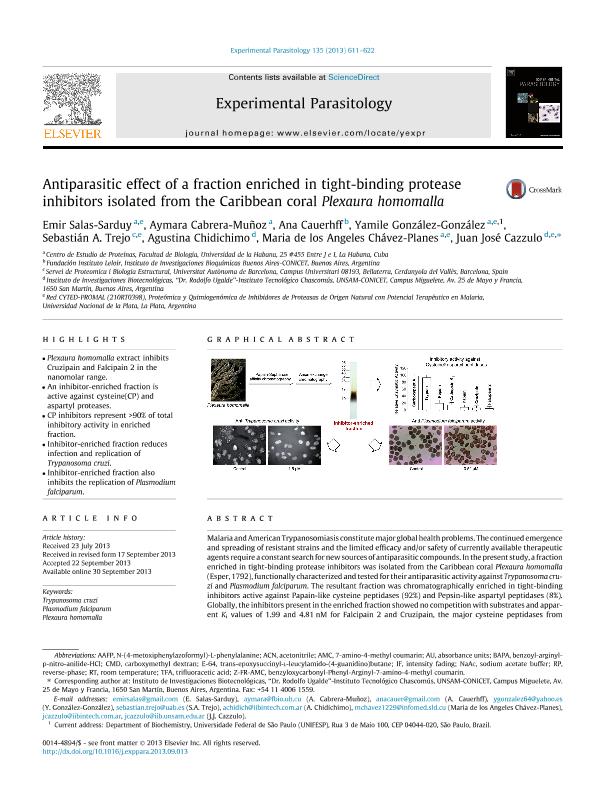Artículo
Antiparasitic effect of a fraction enriched in tight-binding protease inhibitors isolated from the Caribbean coral Plexaura homomalla
Salas Sarduy, Emir; Cabrera Muñoz, Aymara; Cauerff, Ana Albina ; González González, Yamile ; Trejo, Sebastian Alejandro; Chidichimo, Agustina; Chávez Planes, Maria de Los Angeles; Cazzulo, Juan Jose
; González González, Yamile ; Trejo, Sebastian Alejandro; Chidichimo, Agustina; Chávez Planes, Maria de Los Angeles; Cazzulo, Juan Jose
 ; González González, Yamile ; Trejo, Sebastian Alejandro; Chidichimo, Agustina; Chávez Planes, Maria de Los Angeles; Cazzulo, Juan Jose
; González González, Yamile ; Trejo, Sebastian Alejandro; Chidichimo, Agustina; Chávez Planes, Maria de Los Angeles; Cazzulo, Juan Jose
Fecha de publicación:
30/09/2013
Editorial:
Elsevier
Revista:
Experimental Parasitology
ISSN:
0014-4894
Idioma:
Inglés
Tipo de recurso:
Artículo publicado
Clasificación temática:
Resumen
Malaria and American Trypanosomiasis constitute major global health problems. The continued emergence and spreading of resistant strains and the limited efficacy and/or safety of currently available therapeutic agents require a constant search for new sources of antiparasitic compounds. In the present study, a fraction enriched in tight-binding protease inhibitors was isolated from the Caribbean coral Plexaura homomalla (Esper, 1792), functionally characterized and tested for their antiparasitic activity against Trypanosoma cruzi and Plasmodium falciparum. The resultant fraction was chromatographically enriched in tight-binding inhibitors active against Papain-like cysteine peptidases (92%) and Pepsin-like aspartyl peptidases (8%). Globally, the inhibitors present in the enriched fraction showed no competition with substrates and apparent Ki values of 1.99 and 4.81 nM for Falcipain 2 and Cruzipain, the major cysteine peptidases from P. falciparum and T. cruzi, respectively. The inhibitor-enriched fraction showed promising antiparasitic activity in cultures. It reduced the growth of the chloroquine-resistant P. falciparum strain Dd2 (IC50 = 0.46 μM) and promoted the apparent accumulation of trophozoites, both consistent with a blockade in the hemoglobin degradation pathway. At sub-micromolar concentrations, the inhibitor-enriched fraction reduced the infection of VERO cells by T. cruzi (CL Brener clone) trypomastigotes and interfered with intracellular differentiation and/or replication of the parasites. This study provides new scientific evidence that confirms P. homomalla as an excellent source of tight-biding protease inhibitors for different proteases with biomedical relevance, and suggests that either the individual inhibitors or the enriched fraction itself could be valuable as antiparasitic compounds.
Archivos asociados
Licencia
Identificadores
Colecciones
Articulos(CINDEFI)
Articulos de CENT.DE INV EN FERMENTACIONES INDUSTRIALES (I)
Articulos de CENT.DE INV EN FERMENTACIONES INDUSTRIALES (I)
Articulos(IIB-INTECH)
Articulos de INST.DE INVEST.BIOTECNOLOGICAS - INSTITUTO TECNOLOGICO CHASCOMUS
Articulos de INST.DE INVEST.BIOTECNOLOGICAS - INSTITUTO TECNOLOGICO CHASCOMUS
Articulos(IIBBA)
Articulos de INST.DE INVEST.BIOQUIMICAS DE BS.AS(I)
Articulos de INST.DE INVEST.BIOQUIMICAS DE BS.AS(I)
Articulos(SEDE CENTRAL)
Articulos de SEDE CENTRAL
Articulos de SEDE CENTRAL
Citación
Salas Sarduy, Emir; Cabrera Muñoz, Aymara; Cauerff, Ana Albina; González González, Yamile ; Trejo, Sebastian Alejandro; et al.; Antiparasitic effect of a fraction enriched in tight-binding protease inhibitors isolated from the Caribbean coral Plexaura homomalla; Elsevier; Experimental Parasitology; 135; 3; 30-9-2013; 611-622
Compartir
Altmétricas



